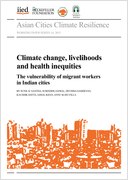Climate change, livelihoods and health inequities: the vulnerability of migrant workers in Indian cities
 This paper examines the vulnerability context of migrant workers’ in the informal sector in three Indian cities (Kochi, Surat, and Mumbai), specifically in terms of how their livelihoods interface with climate change and health inequities. A key assumption is that the progression of vulnerability to climate change and infectious diseases is closely embedded within the wider political economy of migrant workers’ day-to-day livelihood struggles. Using a mixed methodology, data from 50 migrants in each of the three cities were collected using a semi-structured interview schedule. The research demonstrates that urban vulnerability is a condition that shapes and reshapes itself continuously and fiercely, accompanied by the processes and structures of unplanned rapid urbanisation, environmental change and social exclusion. Lack of access to livelihood resources, decision-making structures and power forces the poor to migrate to the cities. If factors such as caste and ethnic-based discrimination also act as a push factor to migrate, the findings show that exclusion continues in the cities, making migrant workers more vulnerable to climate change and infectious diseases. The research also shows that a rise in income is not a sole indicator of reduced vulnerability. Lack of access to other essential livelihood assets, including reliable and affordable health care, reduces the adaptive capacities of migrant workers to deal with extreme climatic events. The paper concludes that migrant workers have very limited opportunities to reduce their vulnerabilities and participate actively in risk reduction and development planning.
This paper examines the vulnerability context of migrant workers’ in the informal sector in three Indian cities (Kochi, Surat, and Mumbai), specifically in terms of how their livelihoods interface with climate change and health inequities. A key assumption is that the progression of vulnerability to climate change and infectious diseases is closely embedded within the wider political economy of migrant workers’ day-to-day livelihood struggles. Using a mixed methodology, data from 50 migrants in each of the three cities were collected using a semi-structured interview schedule. The research demonstrates that urban vulnerability is a condition that shapes and reshapes itself continuously and fiercely, accompanied by the processes and structures of unplanned rapid urbanisation, environmental change and social exclusion. Lack of access to livelihood resources, decision-making structures and power forces the poor to migrate to the cities. If factors such as caste and ethnic-based discrimination also act as a push factor to migrate, the findings show that exclusion continues in the cities, making migrant workers more vulnerable to climate change and infectious diseases. The research also shows that a rise in income is not a sole indicator of reduced vulnerability. Lack of access to other essential livelihood assets, including reliable and affordable health care, reduces the adaptive capacities of migrant workers to deal with extreme climatic events. The paper concludes that migrant workers have very limited opportunities to reduce their vulnerabilities and participate actively in risk reduction and development planning.
